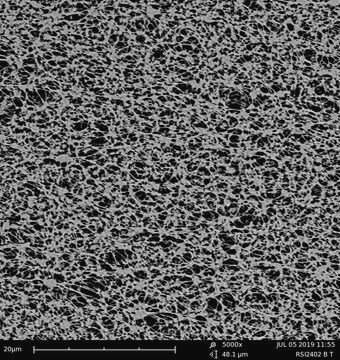추천 제품
제품명
Whatman® PTFE membrane filters, PTFE membrane circles, (TE 36), 0.45μm, 47 mm, 50/pk
material
PTFE
무균
non-sterile
특징
hydrophobic
포장
pack of 50
제조업체/상표
Whatman 10411311
Whatman Article No. 28415315 (US reference)
직경
47.0 mm
공극 크기
≤0.45 μm pore size
적합성
suitable for (applications involving aggressive organic solvents, strong acids, and alkalis)
유사한 제품을 찾으십니까? 방문 제품 비교 안내
일반 설명
Whatman PTFE membrane filters from Cytiva′s business are chemically stable and inert, making them suitable for use with aggressive organic solvents, strong acids, and alkalis.
High chemical resistance and mechanical strength
One of the major applications for the PTFE membrane is the clarification of corrosives, solvents, and aggressive fluids. This includes the important requirement in HPLC analysis for sample filtration where any solid particles can cause permanent damage to the column. The 0.5 µm pore size is normally used. Air and gas sterilization make use of the hydrophobic characteristics of PTFE membrane filters and their ability to stop aqueous aerosols. Pore sizes of 0.2 µm and 0.5 µm are typically used. Sterile* venting of vacuum manifolds, fermentation vessels, and filtrate tanks and containers utilize PTFE 0.2 µm membranes.
High chemical resistance and mechanical strength
One of the major applications for the PTFE membrane is the clarification of corrosives, solvents, and aggressive fluids. This includes the important requirement in HPLC analysis for sample filtration where any solid particles can cause permanent damage to the column. The 0.5 µm pore size is normally used. Air and gas sterilization make use of the hydrophobic characteristics of PTFE membrane filters and their ability to stop aqueous aerosols. Pore sizes of 0.2 µm and 0.5 µm are typically used. Sterile* venting of vacuum manifolds, fermentation vessels, and filtrate tanks and containers utilize PTFE 0.2 µm membranes.
애플리케이션
- Clarification of corrosives, solvents, and aggressive fluids
- HPLC
특징 및 장점
- The TE range features polypropylene support material for improved strength and handling
- Temperature resistant up to 120°C
- Can withstand aggressive solvents, liquids, and gases that damage other membranes
기타 정보
Field of Use : For internal research use only. Products are not intended for diagnostic use or resale.
법적 정보
Whatman is a registered trademark of Cytiva
가장 최신 버전 중 하나를 선택하세요:
자사의 과학자팀은 생명 과학, 재료 과학, 화학 합성, 크로마토그래피, 분석 및 기타 많은 영역을 포함한 모든 과학 분야에 경험이 있습니다..
고객지원팀으로 연락바랍니다.


